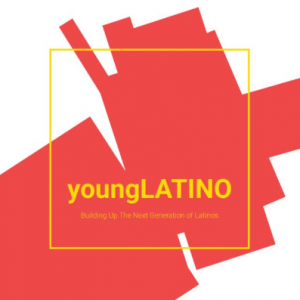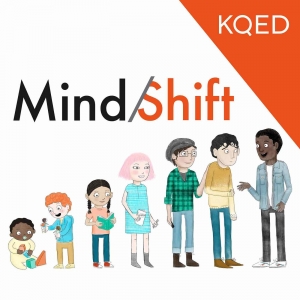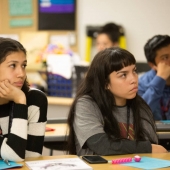youngLATINO Podcast

The youngLATINO Show is a podcast by one of our very own Alumi, Juan Miramontes. Juan graduated from Humanitas in 2014 and went to attend Berkeley University where he graduated from in 2018.
MindShift Podcast

Roberto Vega has taught at schools all over Los Angeles, but when he came to Social Justice Humanitas Academy he knew he’d found something special. Everything about how the school is structured and run is done with the best interests of students in mind. He liked it so much he decided to pull his son out of a popular high school located on a college campus and send him to Humanitas.
“I brought him here for 11th grade and immediately my wife noticed a difference,” Vega said. “She goes, ‘You know it’s weird, he doesn’t want to wear his hoodie anymore.’ He just seemed happier. He really came out of his shell. He got to showcase himself a lot more in the AP classes. He really did thrive here.”
Vega thinks that’s because of great teaching, but also the underlying vision of this school: help students become the best version of themselves. With that vision guiding every decision — from how to support students on academic probation, to hiring — Social Justice Humanitas has built a school where teachers’ voices are central, and everyone is looking out for one another.
The school and the systems that govern it were designed by teachers and have been led by them from the beginning. The founding group of teachers were tired of being told what to do and how to do it by people who were not in the classroom. They felt they knew what their students needed if only the administration would support them to do it.
“A lot of times in education, as teachers, we’ve been taught to wait for someone above us to tell us what to do,” said Jeff Austin, a founding teacher. “And make your plans according to the district or the state, and we were just like, we want to make plans according to our students.”
There are a lot of systems woven together to help students here succeed. They have a robust advisory program, grade-level teaching teams, office hours when kids can get extra support, a fully integrated model for English language learners and special needs students to learn alongside their peers, and a strong school culture.
Students can feel the difference.
“It feels like a family because there’s a lot of people who care about you,” said Davis Tacún. “In a family everybody looks out for each other and that’s how it feels here. Everyone’s connected and no one is really isolated.”
Other students said they felt they could be themselves. They could trust and talk to their teachers, and they had spaces to open up about the difficult things in their lives. All of this enables Social Justice Humanitas to have a graduation rate consistently over 90 percent, even though the rest of Los Angeles Unified is only at 77 percent. Even more impressive, a majority of students graduate with the classes they need to go to college, and about 94 percent of them do go on to college. They’re getting those results in spite of the fact that almost 90 percent of students here live in poverty.
“What has made us successful, and I think a lot of people are starting to listen, is the huggy-touchy stuff,” said Jose Luis Navarro IV, the founding principal of the school. “The stuff that freaks people out. Adults making themselves vulnerable. Building real relationships.”

